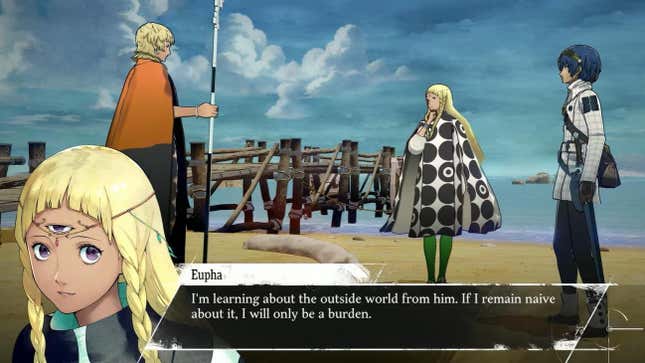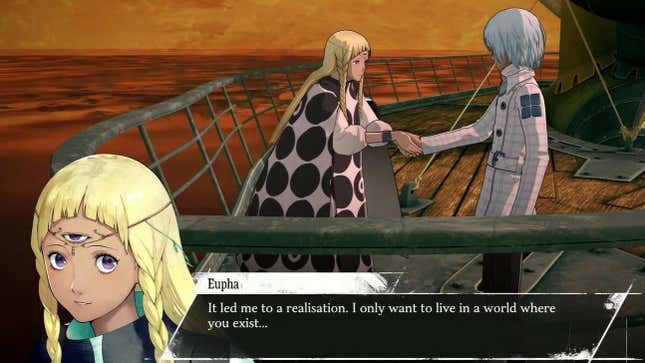The greatest strengths of Metaphor: ReFantazio, the latest roleplaying game from the minds behind Persona, come from the freedom the developers have exerted to pick and choose what they carry over from that beloved series. Unburdened by all the traditions and expectations attached to a name like Persona, Metaphor innovates and experiments in exciting ways. One particularly successful example of this is Metaphor’s lack of a romance mechanic, a hallmark of the Persona series. Yet even in the absence of gameplay systems devoted to romance, Metaphor: ReFantazio doesn’t lack such connections entirely. By removing the player’s role in finding love, the game is able to create a much more compelling representation of romance in its world, and that is best shown in party member Eupha’s storyline.

Much of Metaphor: ReFantazio’s gameplay revolves around forming bonds with NPCs in the world. These function in a similar fashion to social links from the Persona series. You’ll engage in special story moments with characters and build up a bond with them that helps deepen your understanding of the world as well as unlocking new upgrades for combat. One of the biggest criticisms of the Persona series is that female relationships would always end in a romance if seen to completion (something later fixed by the inclusion of platonic routes for all characters). This was often accomplished through messy writing that contorted compelling characters into nothing more than an object of desire for the protagonist, who themselves is a thinly veiled player stand-in. Metaphor’s removal of romance entirely results in every character feeling much more fleshed out as a person in their own right, with their own goals and desires that stand alongside the protagonist’s without the need for a shoe-horned love plot.

Enter Eupha, a young summoner from an island society that has little to no contact with the larger mainland that serves as the setting for most of Metaphor’s action. Yet Eupha is somewhat different from the rest of Metaphor’s cast in that she is explicitly romantically interested in the protagonist. It’s implied that their connection will involve sparks early on when the two have a misunderstanding over a handshake. In Eupha’s culture, a handshake can mean a sign of trust but also has a romantic meaning, something that makes her flustered.
As your bond with Eupha develops, romance isn’t directly at the forefront. Instead, her story focuses on the religious aspects of Metaphor’s world, with you helping her understand the customs of people outside of her island while also rooting out bad actors within the game’s Sanctist church. Throughout all this, Eupha grows into a more knowledgeable, compassionate, and worldly person who seeks to create a deeper connection between her world and the world of the protagonist. By the conclusion of her bond storyline the two have grown quite close, and Eupha asks that the protagonist consent to another handshake, but this time confesses that she means it as a confession of her feelings to him.
None of this storyline occurs in the way that a romantic plot line in Persona would. In that series, you choose to enter a romantic relationship with a character. Metaphor presents a fascinating inversion of this by having the NPC initiate romance. Eupha is explicitly the one attempting to build a better bond with the protagonist in the hope that love will bloom. This works incredibly well thanks to the sharp writing of her character as well as the removal of your ability to shape an NPC into a romantic prospect through gameplay decisions. It is also more thematically in line with a core pillar of Metaphor’s world: you are not the protagonist.

The first thing Metaphor asks you to do is enter a name. The game specifies that this is your name, not your character’s. You name the protagonist later on. Metaphor wants to drill into you that you and the protagonist are not the same entity. He has a voice, he has his own goals and wishes and ways of communicating with the world around him. He is not just a vessel for player gratification, something that feels like a departure from the often blank-slate protagonists of Persona. That’s also why romance as a mechanic is removed, because it isn’t your place as the player to control the feelings the protagonist has toward people. It gives more agency to not only the protagonist, but also to the NPCs in the game, especially Eupha. She expresses her love for him, and while you are given a handful of dialogue options to respond to her with, they all read as confirmations of reciprocated feelings. Hell, the final interaction you can have with Eupha before going into the game’s final dungeon has her bringing you home again, where her brother gives you a stern talking-to about taking care of her.
This might rub some players the wrong way, as it can feel like the game is trapping you inside of a romantic path without warning. But this isn’t about the player, it’s about Eupha and the protagonist, and their relationship being a romantic one is thematically in-line with the rest of Metaphor and with who Eupha is as a person. She is a woman who seeks to create bonds with the people and cultures outside of her island that will allow for a better world to arise. A world of peace, understanding, and love. Her relationship with the protagonist is at the heart of that. The romance that blossoms between the two is proof that their shared mission of bringing a better, more compassionate world into existence is possible. It’s a remarkable story that works due to Metaphor’s decision to focus on romance on a character level, rather than a mechanical one.
.
